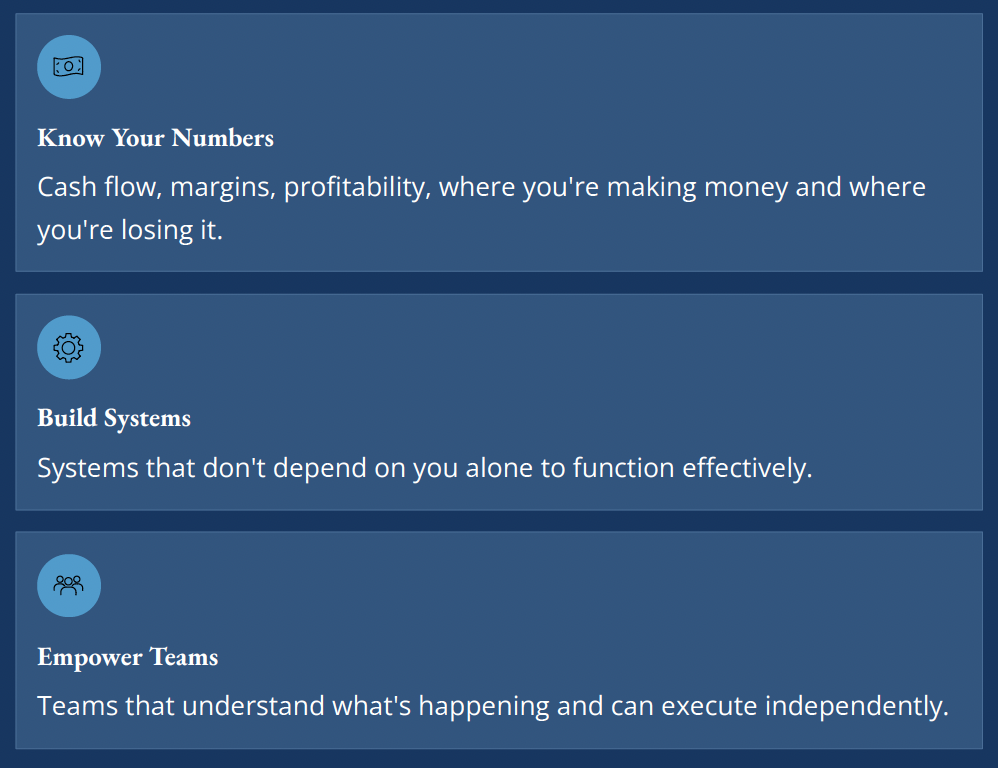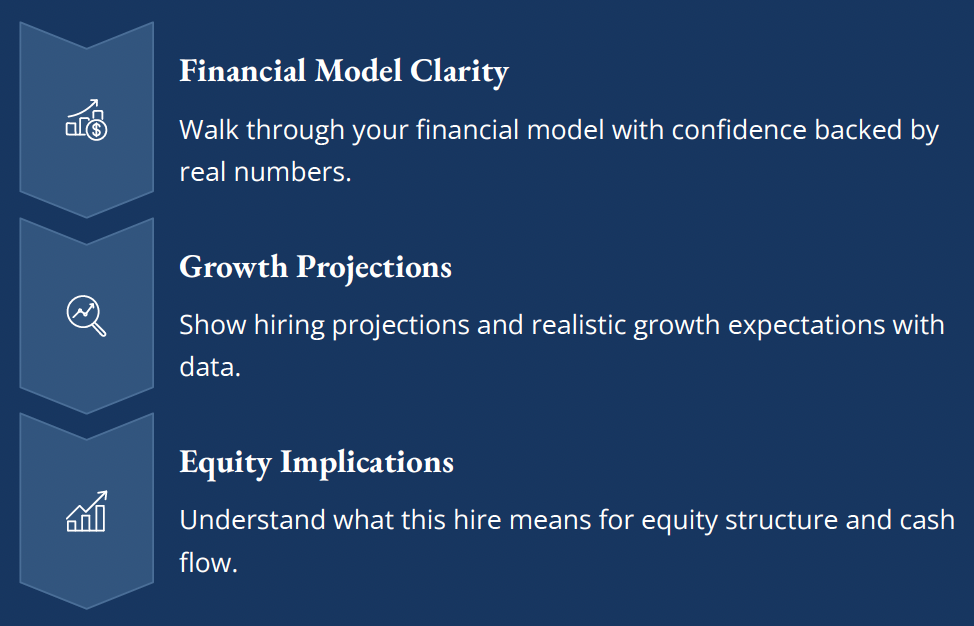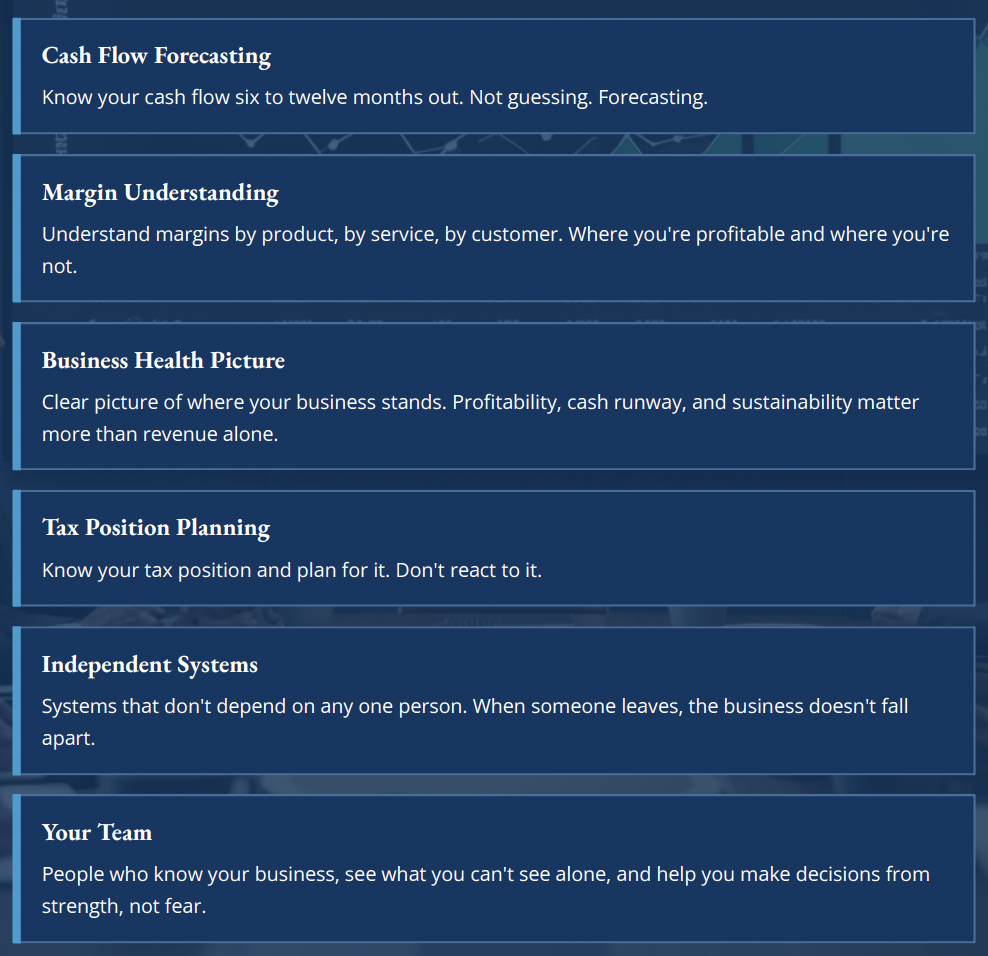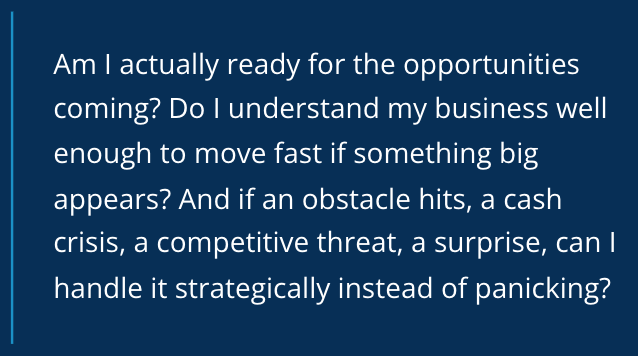Ready for What's Coming
5 Opportunities and 5 Obstacles Every Founder Faces
The Moment That Changes Everything
Every founder faces it.
An offer comes in. A key person walks out. The market shifts. Suddenly you're facing a decision that could reshape your entire business, and you have hours or days to make it, not months.

These moments separate founders. Not luck. Not intelligence. Not how much money you have access to.
The difference is readiness.
What Being Ready Actually Means

Here's what I've noticed working with hundreds of founders.
The ones who navigate critical moments well share one trait: they know their business. Not just revenue. The actual mechanics. They know their cash flow. Their margins. Where they're making money and where they're losing it. They have systems that don't depend on them. They've built teams that know what's happening.
They're ready.
Many founders think they're ready and they're not. They have a bookkeeper. Taxes get filed on time. They check their bank balance every morning. Then something real happens. An opportunity. A crisis. A surprise. They freeze.
Because they don't actually understand what's happening in their business.
They're driving a car while looking in the rearview mirror. They can see where they've been. They can't see where they're going or what's about to hit you.
That's the gap we help founders close.
Five Opportunities a Ready Founder™ Seizes
-
The Investment or Acquisition Offer
An investor gets serious. A strategic buyer shows interest. Suddenly your business has real exit potential. You have days to decide. Maybe weeks.
What a Ready Founder knows: They can pull clean financials in hours. They understand their cash flow, their margins, their profitability by product line. They know their tax position exactly. They've already thought through how the deal affects their personal wealth. They don't panic because they've done the work.
What gets missed: We had a founder who got acquired and discovered after the deal closed that his entity structure cost him $2M in taxes. Money that should have gone to him and his team was gone. Another founder got an acquisition offer. He didn't have clean financials ready. By the time he pulled them together, the buyer had lost interest and walked. The window closed. A Ready Founder doesn't face these scenarios because the work is already done.
-
The Talent You Need to Hire
Your ideal person, the one you've been hoping to find, becomes available. But they want clarity on business health, equity structure, and growth trajectory before they commit.

What a Ready Founder knows: They can walk through their financial model with confidence. They can show hiring projections, equity implications, and realistic growth expectations backed by real numbers. They close the deal because they understand what this hire means for the business.
What gets missed: I've seen founders hire their dream person without understanding the financial impact. Six months later, they realized they couldn't afford the salary they'd promised. They couldn't scale the way they wanted. They had to let the person go.
Relationships damaged. Team trust broken. A Ready Founder knows the numbers before the conversation starts. They know what they can afford. They know what this hire does to cash flow and ability to scale. The conversation is backed by data, not hope.
-
The Market Shift That Demands Quick Action
Your market is moving. A competitor drops their price. Demand for your product spikes. A new regulation opens doors. You have a window to capitalize, but it's closing.
What a Ready Founder knows: They know exactly how much money they make on each sale. They know how much they're spending to get a customer. When the moment hits, they don't guess. If demand spikes, they can say: "I make $200 per customer. It costs me $50 to acquire them. I can spend up to $100 to get more customers and still be profitable." They make the hire. They run the campaign. They move fast because they have a number, not hope. And on pricing, they know what they can cut without going broke.
What gets missed: Founders without this clarity panic. They see competitors dropping prices and slash their own pricing to keep up, destroying profit in the process. Or they see demand spike and hire and spend aggressively on marketing, then three months later realize they're losing money on every sale. Or they're so afraid of moving wrong that they do nothing and someone else captures the market.
-
The Partnership or Integration That Could Transform Growth
Someone approaches about a partnership. A platform integration becomes possible. A strategic channel opens up. Growth acceleration on the table.
What a Ready Founder knows: They assess financial impact quickly. Margins. Cash flow. Team resources. What would this actually cost? They model it and decide in days, not weeks. They have the bandwidth, mental and operational, to evaluate strategically.
What gets missed: A founder got excited about a platform integration opportunity. The upside looked huge. Without running the numbers, he committed. Six months later, he realized it was burning cash and destroying his margins. He couldn't get out. A Ready Founder models first. If the numbers don't work, he says no. He doesn't get trapped in a partnership that looked good until he really looked at it.
-
The Moment You're Ready to Plan Your Exit
 You don't need to sell tomorrow. But you want options. You want to know that if you decided to exit in the next three to five years, you'd be positioned to maximize value and handle tax implications strategically.
You don't need to sell tomorrow. But you want options. You want to know that if you decided to exit in the next three to five years, you'd be positioned to maximize value and handle tax implications strategically.
What a Ready Founder knows: They're thinking about exit from a tax planning perspective today. They understand their entity structure, capital gains exposure, and strategic moves that position them for a better outcome. They don't wait until negotiations start to figure this out.
What gets missed: When I sold my tech company, I learned this the hard way. By the time I was in exit conversations, it was too late to do the tax planning that would have positioned us better. We left significant money on the table. Enough to fund college for both my kids. Founders without this framework face the same consequence. Hundreds of thousands, sometimes millions, left on the table because by the time they're negotiating, the moves that would have protected them are no longer available.
Five Obstacles a Ready Founder™ Handles
-
The Unexpected Cash Crisis
A major customer delays payment. Your biggest government contract gets cancelled due to policy changes. A key supplier needs payment upfront. Payroll is due next week. Something you didn't forecast happens.
For government contractors, this is real. Policy shifts overnight. One bad decision at the federal level and a contract that was supposed to fund your year is gone. COVID showed us what happens when the unexpected hits. Businesses with cash reserves and clear forecasts survived. Businesses running lean went under. For many founders in that space, it wasn't theoretical. They watched it happen to their competitors.
What a Ready Founder does: They don't panic because they've forecasted cash flow six to twelve months out. They know exactly how many months of payroll they can cover if revenue stops tomorrow. They've modeled contingencies. They know which decisions buy them time (cut discretionary spending) and which they can't make (they can't stop paying people). They have options. When the crisis hits, they respond strategically, not desperately.
What gets missed: Founders without forecasting make emergency decisions that hurt worse than the original problem. They take predatory loans at terrible rates because they're desperate. They cut salaries in ways that damage team trust. They stop paying vendors and destroy relationships. Or they build the entire business around a single contract and when it evaporates, so does the company.
-
The Key Team Member Who Leaves
Your operations manager quits. Your lead engineer gets recruited away. Your finance person decides to move. It happens.
What a Ready Founder does: They have clear systems and documentation. When someone leaves, their role doesn't leave with them. Financial controls are in place, so they're not dependent on one person knowing where everything is. They backfill faster because the job is defined and documented.
What gets missed: A founder's operations manager, with him from day one, got recruited away. Suddenly nobody knew the vendor relationships, the processes, the financial systems. Everything flowed through this one person. The business limped along for months before he could fill the role. Another founder faced the same situation. His CFO left. But because he had clear systems and documentation, he promoted from within. No loss of momentum. No crisis. The difference? Systems and preparation.
-
The Margin Deterioration You Didn't See Coming
You're hitting revenue targets. The business feels strong. Then you dig into the actual numbers and realize something quietly went wrong. Your margins have been eroding. Your costs are creeping up. A product line you thought was profitable is actually a drain on the business.
What a Ready Founder does: They catch this because they're looking at margins regularly, by product, by service line, by customer. They know which customers are profitable and which aren't. When something starts to shift, they see it and fix it before it becomes a crisis. They've asked the hard questions about pricing.
What gets missed: Founders without this discipline wake up one day and realize they're running a business that's way less profitable than they thought. By then they've hired a team, built infrastructure, made commitments around unprofitable growth. Fixing it means painful cuts or a major pivot.
-
The Financial Control Breakdown
Someone on your team is making questionable decisions with company money. Your expenses are all over the place. You can't get a clear picture of what's actually happening. You realize you don't have proper controls in place.
What a Ready Founder does: They've built a financial framework with clear controls. They review financial statements monthly. They understand their cost structure. They know what's normal and what's not. When something is off, they catch it quickly and address it before it becomes a bigger problem.
What gets missed: A founder discovered one of his team members had been booking personal expenses as business expenses. It started small. Then bigger. By the time he caught it, months had passed. He had no controls. No monthly reviews. He had to bring in lawyers. The situation got messy. Expensive lesson. A Ready Founder has controls. Catches problems early. Addresses them before they become crises.
-
The Moment a Competitor Gets Serious
A well-funded competitor enters your market. A larger competitor moves into your segment. The competitive landscape changes overnight.
What a Ready Founder does: They respond strategically, not reactively. They understand their economics well enough to make hard decisions about pricing, features, and investments. They know what competitive moves would actually hurt and which are just noise. They decide where to fight and where to defend.
What gets missed: A competitor with VC funding enters the market and starts price wars. A founder panics and cuts his prices 30% to keep up. Three months later, he's losing money on every sale. He's burning through cash. He can't recover. Meanwhile, a Ready Founder knows his margins cold. He knows what he can afford. He doesn't panic. He competes on value, not price. Or he decides to compete in a different market segment where he has an advantage. He makes a strategic choice, not an emotional one.
The Real Difference

These opportunities and obstacles aren't hypothetical. We've seen every single one with our clients. The ones who navigated them well were ready. The ones who struggled were flying blind.
Being ready doesn't mean having all the answers. It doesn't mean being perfect.
It means having clarity. It means understanding your business well enough to make decisions quickly. It means having systems and frameworks in place so when things get messy, and they always do, you're not starting from scratch.
What "Ready" Actually Requires
Real clarity requires more than checking your bank balance or filing taxes once a year.
You need to know your cash flow six to twelve months out. Not guessing. Forecasting.
You need to understand your margins by product, by service, by customer. Where you're profitable. Where you're not.
You need a clear picture of where your business actually stands. Revenue matters. Profitability, cash runway, and sustainability matter more.
You need to know your tax position and plan for it. Not react to it.
You need systems that don't depend on any one person. When someone leaves, the business doesn't fall apart.
And here's what really matters: you need a team. Not necessarily on your payroll. But a team. People who know your business. People who can see what you can't see alone. People who help you make decisions from a position of strength, not from fear.
That's what it means to become a Ready Founder.
The Path Forward

We're heading into year-end planning. You're probably thinking about 2026 already. Before you set your goals for next year, answer this honestly:
Am I actually ready for the opportunities coming? Do I understand my business well enough to move fast if something big appears? And if an obstacle hits, a cash crisis, a competitive threat, a surprise, can I handle it strategically instead of panicking?
If the answer is "I'm not sure," you already know what to do.
Ready Founders don't just build bigger businesses. They build businesses they understand. They make decisions from clarity, not from fear. They seize opportunities others miss because they're prepared. They weather storms others can't because they have frameworks in place.
That's what we help you become.
If you're ready to move from hoping your business is healthy to knowing it deeply, let's talk. We'll show you exactly where you stand financially and what's needed to position your business for what's coming next.
Ready for Your Next Move?
Before you set your goals for next year, get clear on where you stand today. Choose the financial pillar that's keeping you up at night most - each assessment takes less than 10 minutes and shows you exactly what to fix first.
Because the best time to be ready is before you need to be.
About the Author: Rod Loges is CEO of One Degree Financial and host of the MILCOM Founders podcast, where he helps veteran entrepreneurs build businesses with strong financial foundations.

